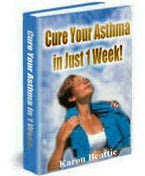Asthma is a disorder that intermittently causes shortness of breath and difficulty breathing, although the exact type and severity of symptoms vary from person to person. Some people with asthma have cough, wheezing, and trouble breathing nearly every day. Others feel perfectly well in between occasional attacks of chest congestion and wheezing. Some Olympic athletes with asthma experience only a tightness in the chest during world-class athletic competition. Other people have such severe asthma attacks after exercising that they require emergency treatment. All people with asthma share something in common, however: breathing passageways that periodically become abnormally narrow.
More than 20 million people in the United States — about 7% of the population — have asthma (see Asthma in America, below). Most people tend to think of asthma as a childhood disease, for good reason: Most cases of asthma are diagnosed by age five. Nonetheless, adults of any age may develop asthma, although the likelihood of developing it becomes increasingly rare the older you get. Studies indicate that as many as 10% of people over 65 have asthma, higher than the prevalence of asthma in childhood. If you are an adult with asthma, it is likely that you have had the disorder for a long time and will continue to deal with it for the rest of your life.
For reasons that are unclear, children with asthma often grow out of their illness, usually around adolescence. If the condition develops or persists into adulthood, though, it is rare that asthma just goes away. But the condition can be managed. In fact, if you have asthma, you can anticipate being free of symptoms and fully active almost all the time.
Tuesday, February 3, 2009
Subscribe to:
Post Comments (Atom)

No comments:
Post a Comment